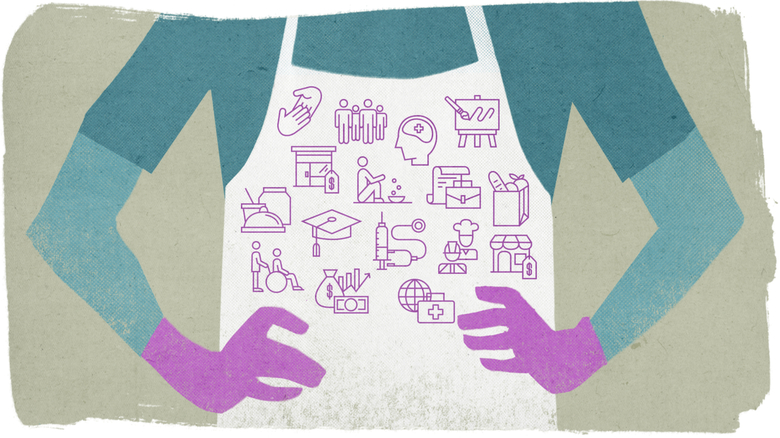
My son ran into my Zoom room last week and yelled, “Fart! Poop!” It was no big deal, but it is part of the reality that we who are caregivers constantly manage. In truth, he needed my attention. He has been home since March 13—over four months—playing way too much Fortnite, watching a billion seasons of Naruto, and wishing he could play with his friends. So now I’m his friend. We have a family poker night and we play Zoom pictionary with his grandparents. But we’re no substitute for other 11-year-old kids, and the computer is certainly no substitute for school or summer camp.
I’m trying to get a paper done this week. I haven’t started learning how to teach online, even though that’s what I’ll be doing in a little over a month. I have another abstract due in two days and a chapter expected before the end of summer. Three students just asked me to read their proposals, and one of my students needs help as she struggles with her mental health. My other service obligations have me designing web pages, sending emails, assessing award packages, and guiding a mentoring group. This is all recognizable, right? It’s our job.
So what’s gonna give? My paper? My son’s math ability? Our collective sanity? Has anybody eaten a vegetable this week?
The truth is, as a caregiver I have it easy. My children are old enough to pursue their own interests for considerable periods each day without my intervention, and I have a wildly supportive partner. And tenure. Lots of faculty members have kids who are younger and need much more direct (read: constant) care. And because of the overlapping life-stage demands of family and academia, which sociologists call “greedy institutions,” those faculty members with young children are likely also either pre-tenure or in precarious contract or part-time positions. Other faculty members are “sandwiched” between caring for children and caring for aging parents, which is challenging even when nobody is at risk of contracting a deadly viral infection at the grocery store. These people are tired.
COVID-19 has provided yet another opportunity for us in the US to grapple with the fact that people need care. Children need care, and it is women in families who disproportionately provide it. People with illnesses need care, and it is women in health occupations who disproportionately provide it. Parents, partners, neighbors, cousins, students, friends — they all need care. Cisgender and trans women who head their families solo or are in straight relationships bear the brunt of this care work. This gendered pattern of care, I know from both study and experience, is felt acutely by women in academia.
One of the actions the George Washington University Faculty Association, GWUFA, has taken to support caregivers in our ranks is to circulate a petition demanding that faculty be able to choose for themselves—not beg the administration—whether they will teach in-person or online this fall.
Looking more broadly across the university, GWUFA has also asked faculty—especially including those with tenure and those in administration—to block any layoffs of workers anywhere in the university. This includes the housekeepers who are charged with keeping classrooms and offices sanitary, IT personnel who keep our technology working, and the staff who often serve on the frontlines of each office on campus. Employees who have caregiving responsibilities are in a particularly precarious position when their employer claims—erroneously—that layoffs are necessary here.
GWUFA also has its ear to the ground seeking resources to directly address the gendered inequities that can arise from our university’s failure to fully integrate workers’ caregiving responsibilities into our organizational plans. One quick no-brainer: We should be paid for learning how to teach online! It’s work, and we’re all doing it, for free, even though the caregivers we need to hire so we can do it are not free. On issues of productivity, we applaud the university for granting year-long extensions to faculty members’ tenure clocks if needed, but we continue to be discouraged by the administration’s failure to grant equivalent protections to contract faculty members. We support the Aspire Alliance’s recent call to acknowledge and affirm a work slow-down while we grapple with the pandemic, and to thoughtfully weigh the levels of productivity among those with and without caregiving responsibilities. Specific people, such as Pandemic Response Faculty Fellows, should be appointed (and rewarded) for attending to the potentially disproportionate gender, race, and caregiving impacts of any actions the administration takes during this period. We also recommend that GW value and honor the extraordinary forms of service our faculty are providing right now, and to use this as an opportunity to acknowledge and reward the extra burden of service that faculty of color and white women, in both tenured and non-tenure-track positions, regularly over-provide for the university.
And finally, let’s not pretend to be “strong,” either as individuals or as a university. What we’re going through is hard, and “strength” does not prevent COVID-19 from spreading through ventilation systems, nor does it play tic-tac-toe with my son while I’m supposed to be in a HyFlex webinar. It is wisdom and clarity we need to integrate our needs as human beings with our scholarly responsibilities, and a university should be well-positioned to provide those. Until we see some semblance of those characteristics from GW’s leadership, GWUFA would like to make sure that all the caregivers in our community know: We see you, and we are fighting with and for you.
(Image Credit: CNN)